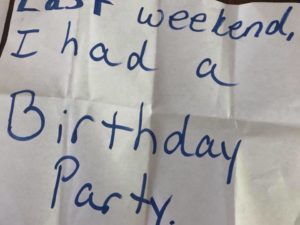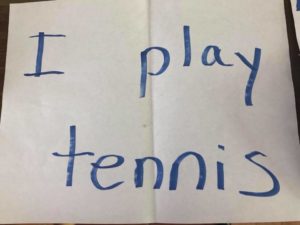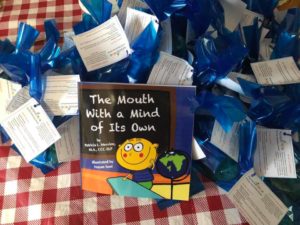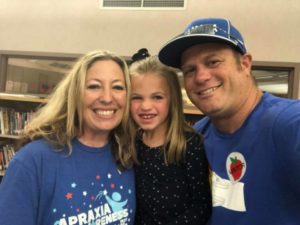The 6th apraxia awareness day brought smiles, tears, and a jaw dropping moment
Can it be that this is officially the SIXTH Apraxia Awareness Day? The first one was way back in 2013 and was fresh off the heels of Ashlynn’s diagnosis. At that time I was in such a sad place and having an awareness day was uplifting, empowering, inspiring, and amazing.
Not much has changed, but for different reasons. This was the first year I decided to go into Ashlynn’s classroom and officially “teach” about apraxia to her classmates. I hadn’t done it before because apraxia didn’t seem to be keeping her from living her life and making friends, but this year had been different. Though Ashlynn’s apraxic component is considered mostly resolved, her co-morbidities of dysarthria and language disorder impact her word finding, ability to get her words out, and make her talk slower and sound a little slushier and not as crisp as other students.
I had a 5th grade student I have seen since second grade come and give the presentation with me. Interestingly enough, I met and started treating him in second grade, when he was in the very same classroom that Ashlynn was currently in. As we sat in front of 86 second graders, I saw his confidence grow throughout the presentation.
I sat behind him ready to clarify anything that didn’t need clarifying. Like a pro, he listed the three main causes:
1.) Genetic
2.) Brain injury
3.) No known cause and just present at birth
He was adamant to me beforehand that the kids know you “can’t catch it.” I thought it was odd and told him I thought most kids wouldn’t think that, but if he wanted to say that it was a valid point. I was shocked, I mean stunned, when I tell you what happened when he asked those 86 second graders if they thought they could catch it like a cold.
THEY ALL RAISED THEIR HANDS.
I was shocked, but my 5th grade student wasn’t. He knew. I know a lot about apraxia, but this was new. I had no idea kids thought they could catch it just by hanging out with her. Oh my gosh!! Had I known this I would have been teaching about apraxia to her class EVERY awareness day since she was in preschool. Like a professional, and with his apraxia on display, my 5th grade student explained apraxia was nothing like a cold and you couldn’t catch it. He reiterated the three main causes and moved on. I had to have been beaming with pride from behind him.
Next up was our demonstrations on what it feels like to have apraxia. My student gave the example of having the kids imagine they wanted to say “dog” and they knew the word “dog” but when they opened their mouth they said something completely different like “bwog,” and no matter how much you know how to say it and what you want to say, your mouth won’t say it correctly. The second graders eyes were big and curious.
Since Ashlynn also has extreme word finding issues compounded by anxiety, I had prepared an activity in which we called up two students. I had a sentence written on a piece of paper that student 1 would have to act out for student 2 to guess without saying words.
My student called on a boy and a girl each time for the first three examples. For the fourth, just like a true teacher, he asked Ashlynn to call on two students. She was excited to have control.
After this activity it was time for questions.
“How many kids have it?” asked one student. About to jump in this 5th grader said,
“1 in every two schools.” What a great way to say 1 in every 1000 students!
“What does it feel like? Does it hurt?” asked one child. The 5th grader answered that it doesn’t hurt physically but it hurts emotionally. Actually he had an apraxic moment and said the opposite, but I was there to make the minor clarification and he went on to explain that it hurts emotionally. “It hurts when you want to get something out and you can’t and it makes you sad.” I seriously think I had tears in my eyes. He was getting through to these kids.
The day was so full circle. When I met this 5th grader, I had just completed my Apraxia-Kids bootcamp training and was ready to help and empower children with apraxia. Here I sat three years later from bootcamp and six years later from Ashlynn’s diagnosis beaming with pride. What I learned today was our kids with apraxia are going to be okay. Empowering them with knowledge and giving them a platform to educate and be their true authentic selves is going to be the winning formula. Beyond resolving or not resolving, having residual effects or not, empowering our kids with knowledge and then giving them the opportunity to educate is going to change the world. It really is, and I know our kids may struggle in school, but they are going to win in LIFE.
We sent the kids away with treat bags and an informational tag on apraxia. I had planned on reading the book in the picture but decided against it because the demonstration was so much more powerful and interactive.
At the end, my 5th grade student passed out treat bags with Ashlynn. Where Ashlynn was shy and reserved, he encouraged her to stand with him and help him pass them out. She beamed and felt special. I looked at them and saw the passing of the torch. I had empowered him, and here he was empowering and encouraging my daughter. I just sat back and watched with tears of gratitude in my eyes. I have told him multiple times, begged him actually to come back and find me somehow when he is older. I know he is destined for so many greater things than just his apraxia. In fact, apraxia has prepared him to be the incredible person I know he’s going to be.



